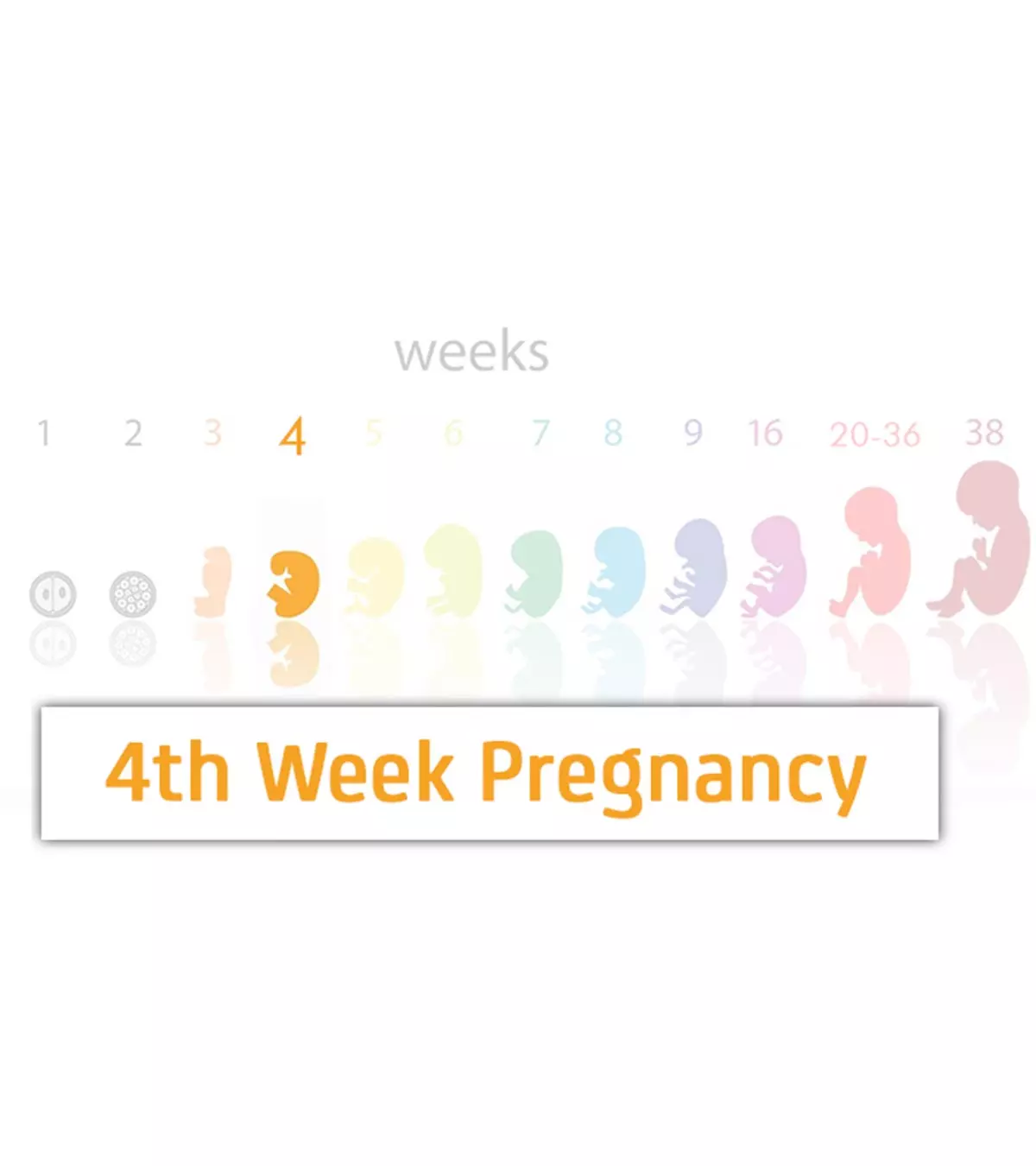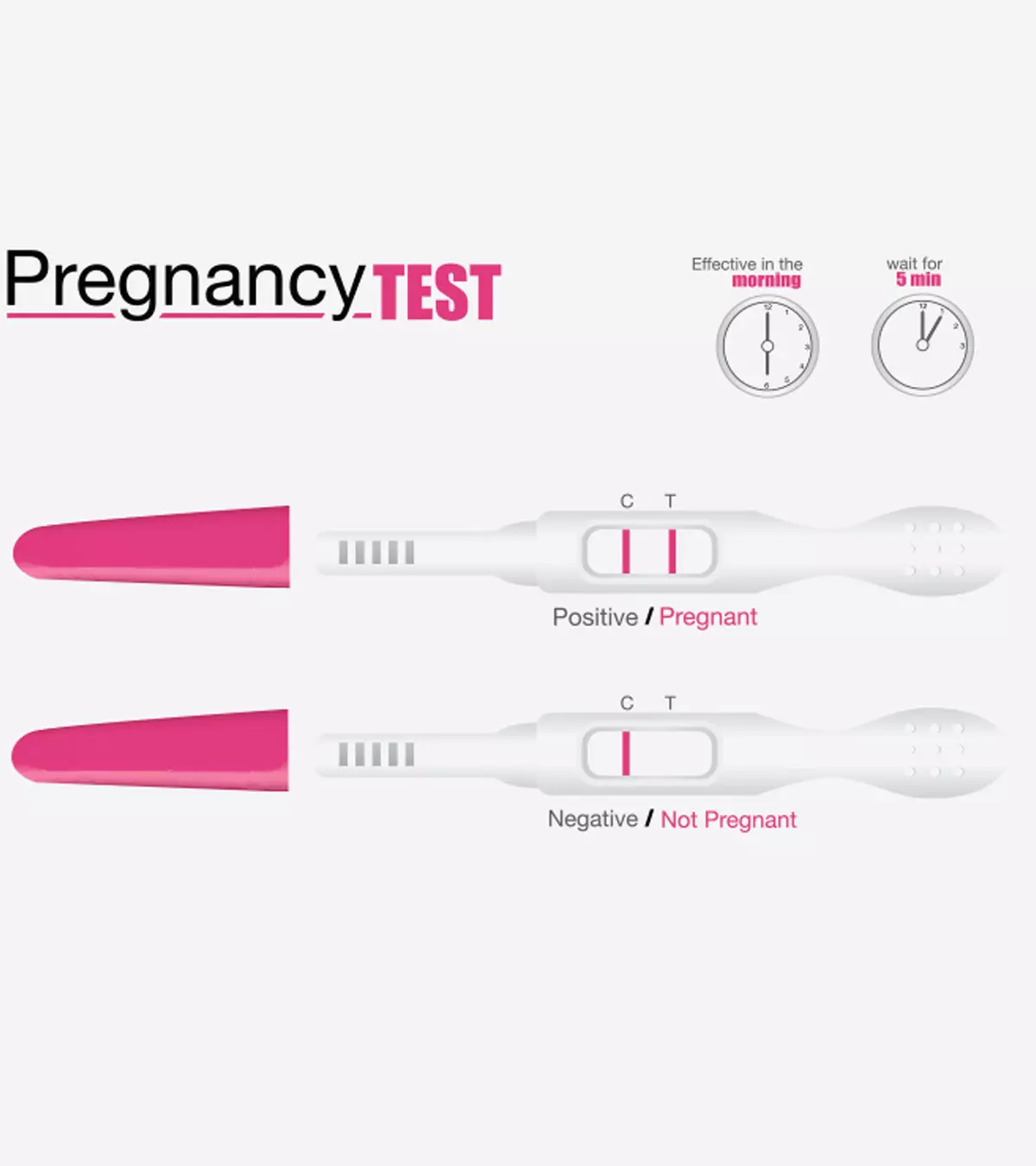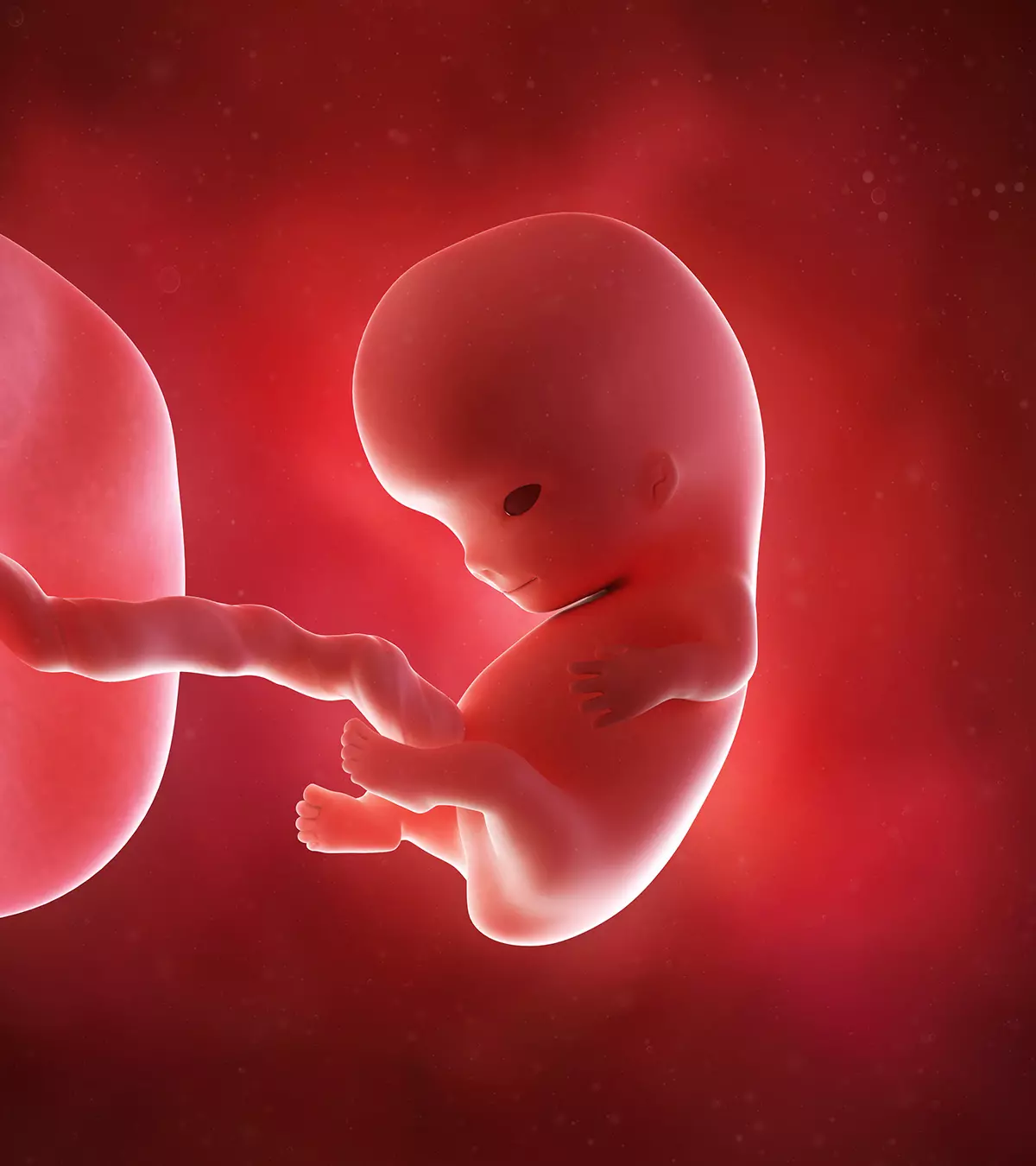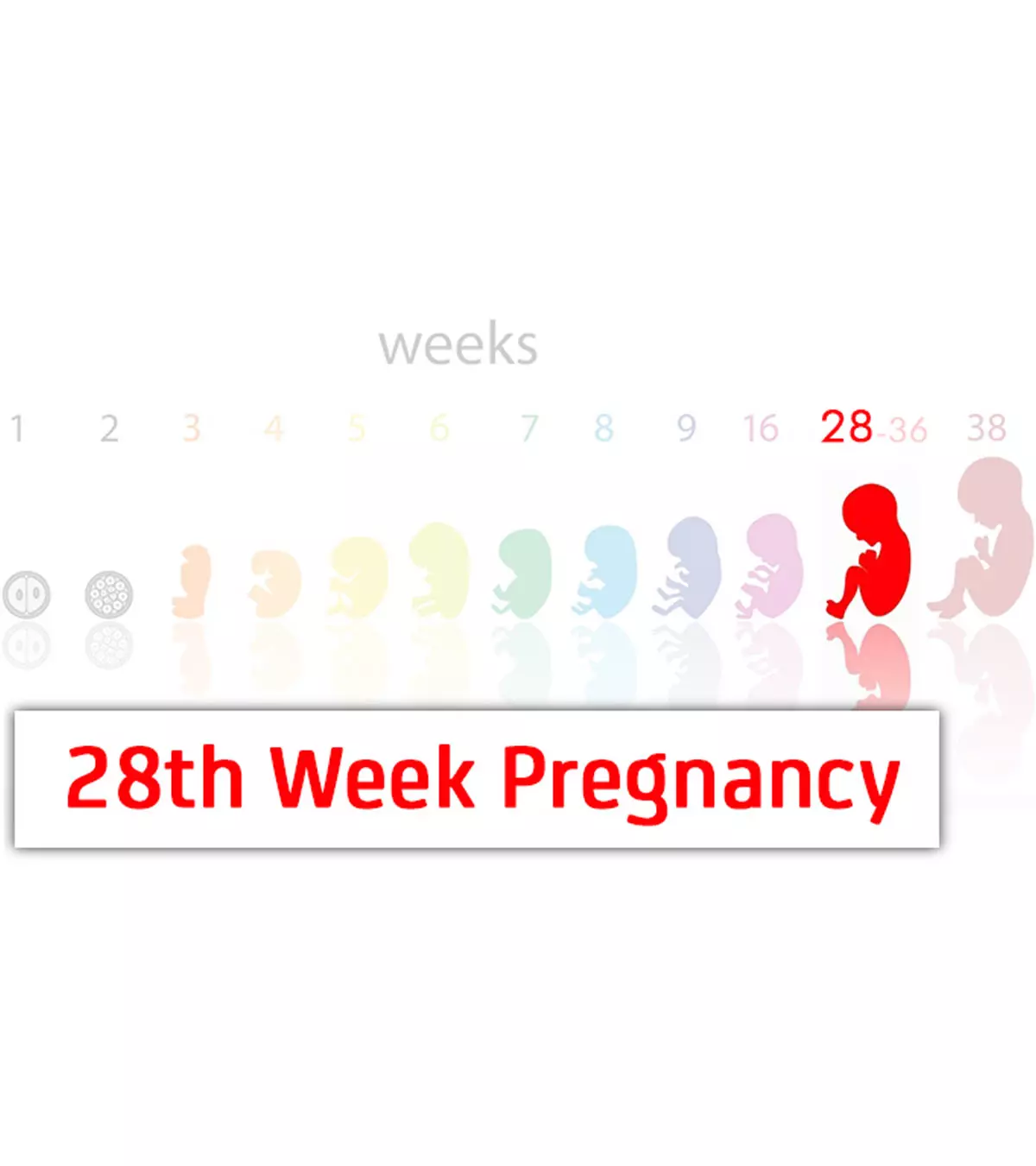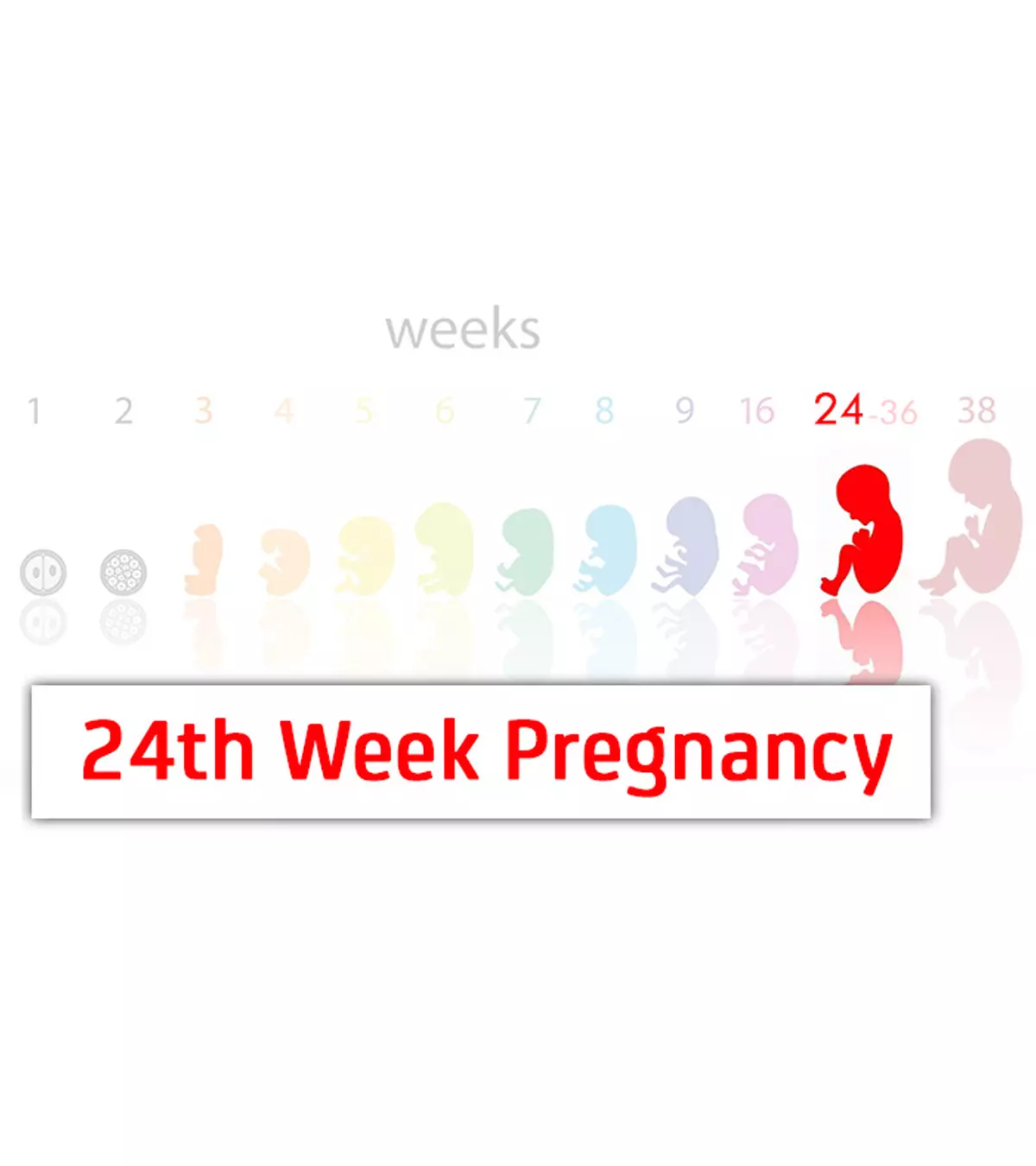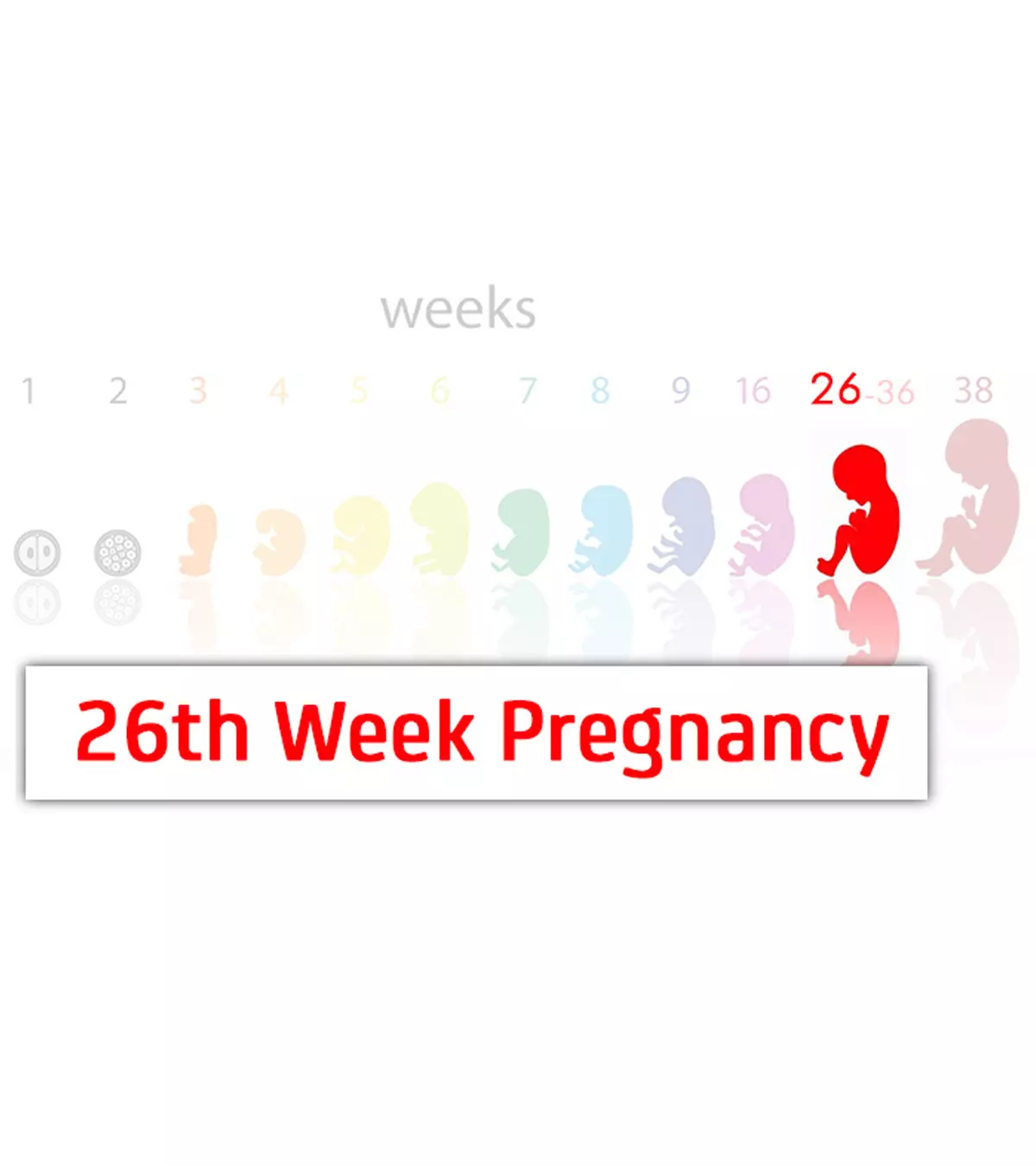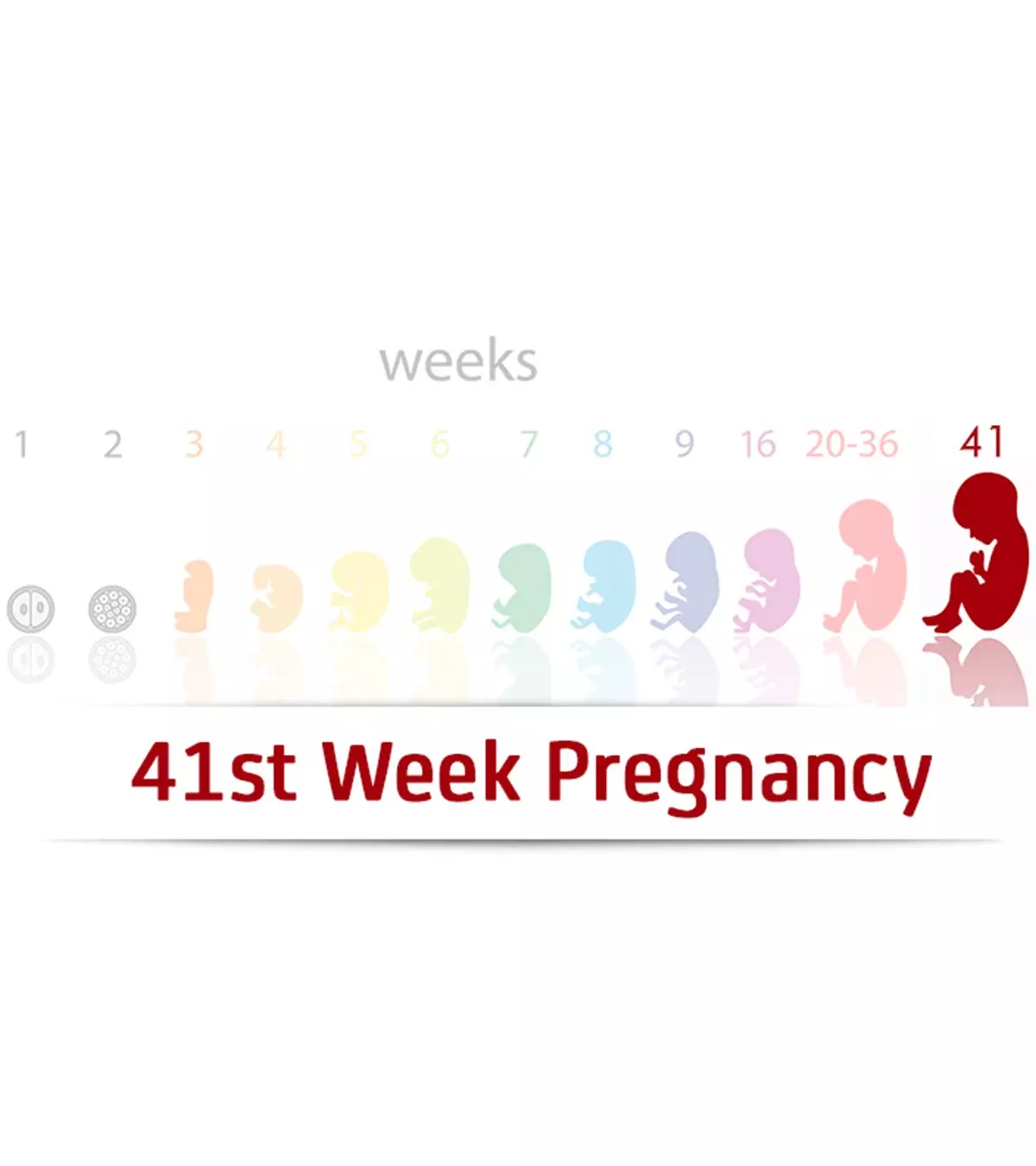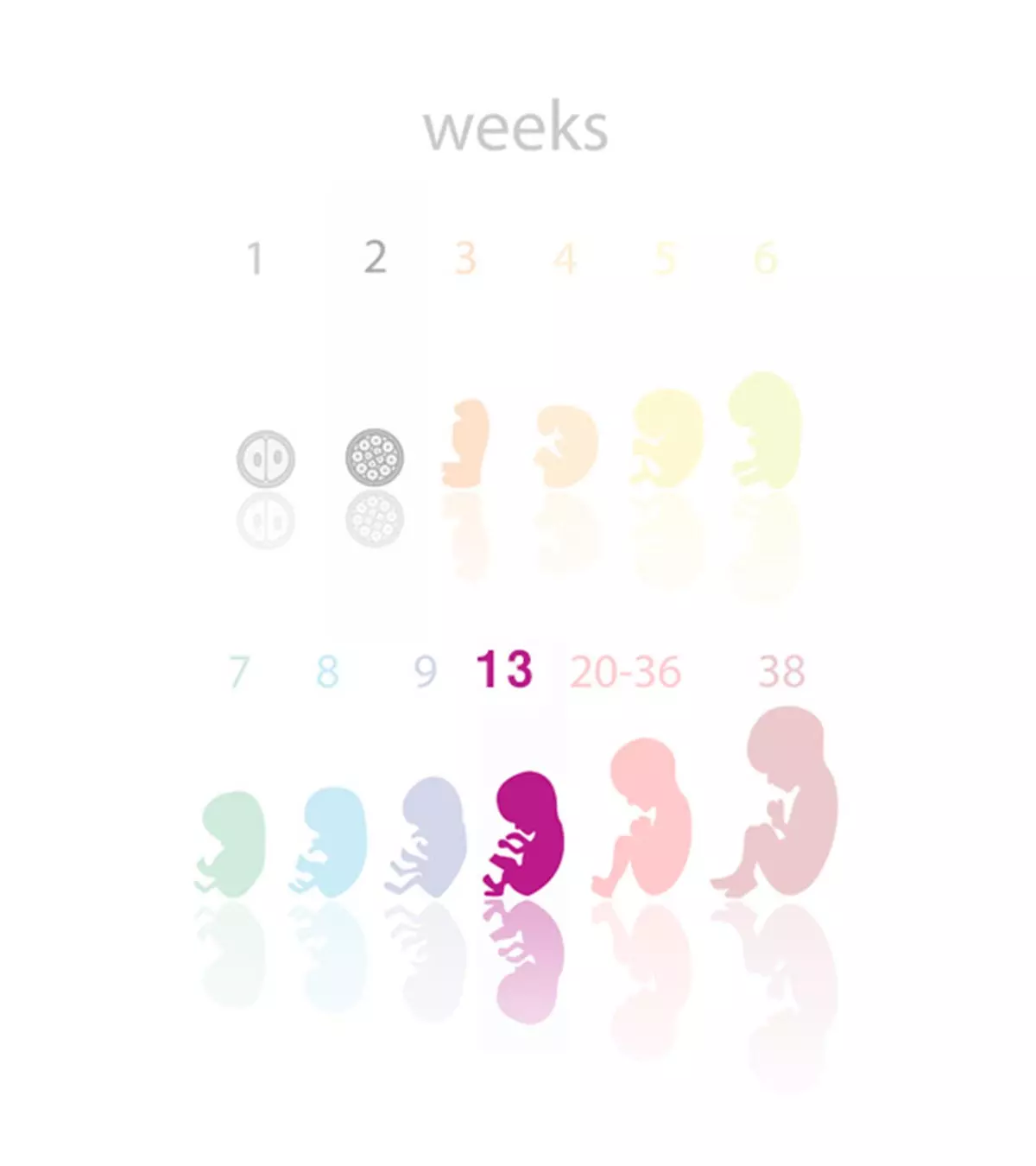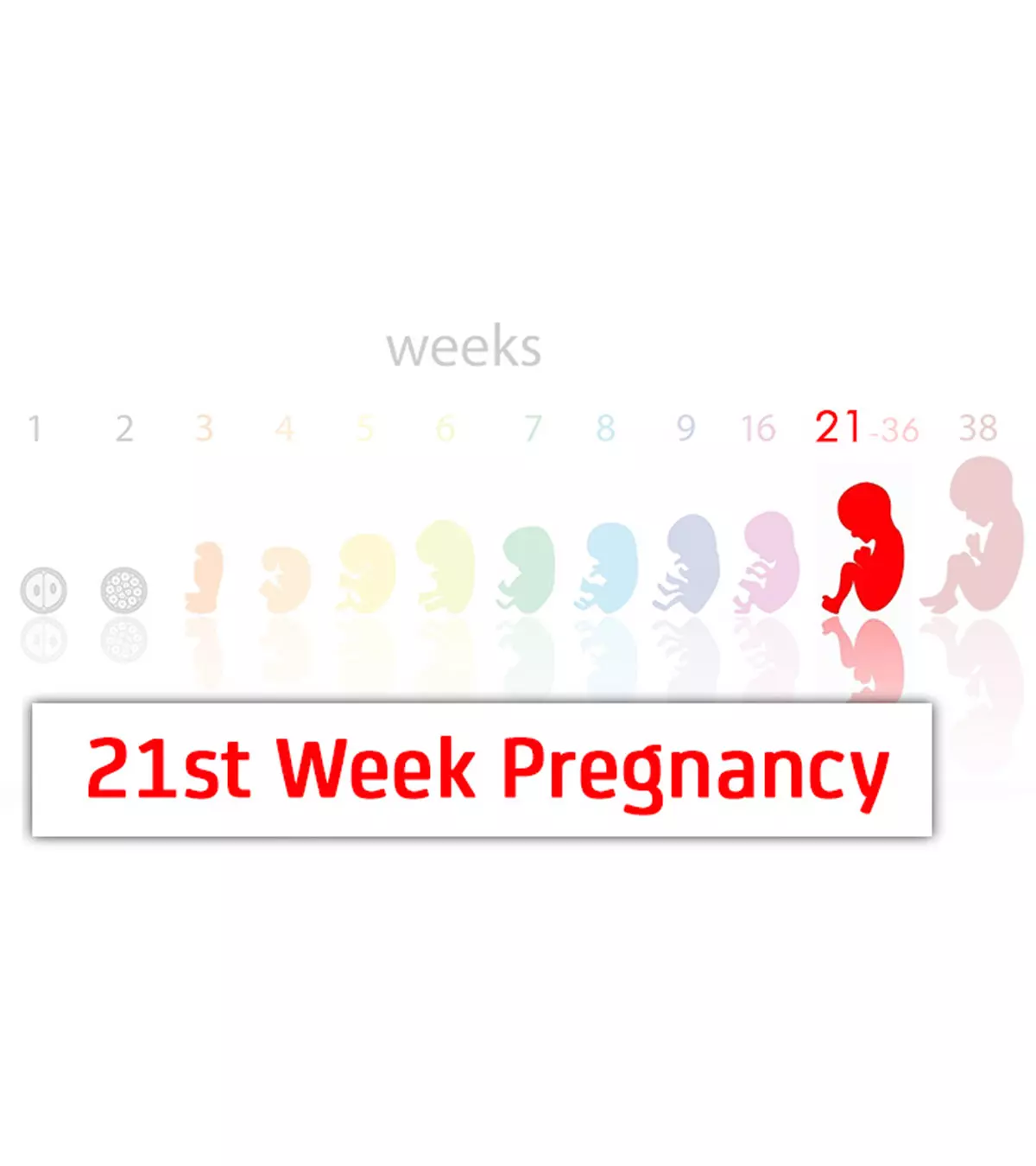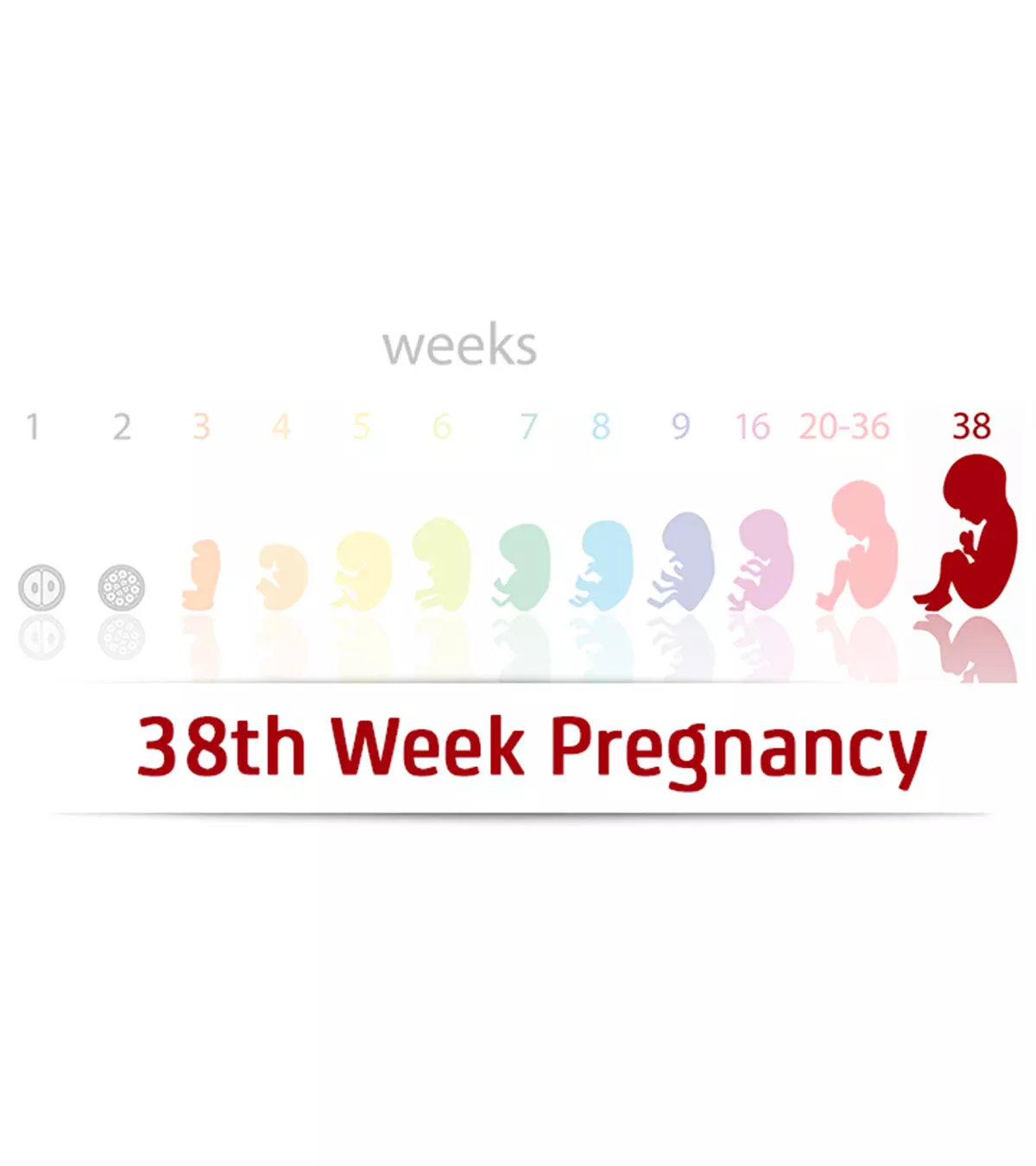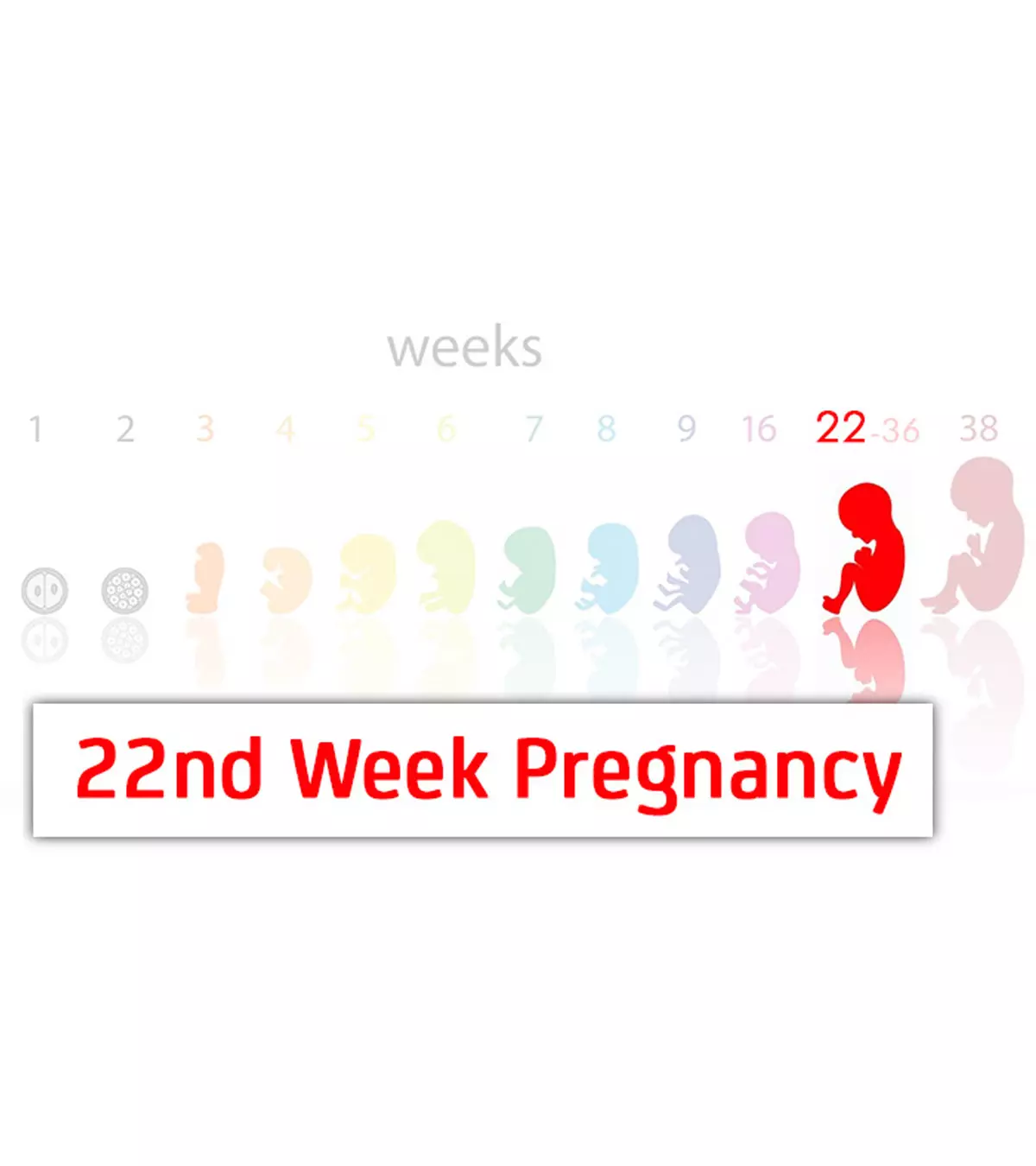
Image: ShutterStock

Key Pointers
- At 22 weeks, the fetus measures about 10.94 inches in length and weighs 1-1.5lb.
- The baby’s vital organs are developing, and the taste buds and first poop form by this week.
- Slight baby movements may be felt, and the baby may begin to respond to sound and touch.
- Pregnant women may gain weight and experience discomforts such as leg cramps, heartburn, edema, and hemorrhoids.
- Physical changes may include a growing belly, stretch marks, and bigger and darker nipples.
- Anxiety and mood swings may constitute emotional changes this week.
How Many Months Pregnant Are You At 22 Weeks?
At 22 weeks, you are in the fifth month of pregnancy.
How Big Is Your Baby At 22 Weeks?
This week, your baby is about the size of a spaghetti squash
(1). It will measure 10.94in (27.8cm) in length and weigh 1-1.5lb (500 -700g) (2).
 Quick fact
Quick factBaby Development At 22 weeks
Here is how your baby develops during this week:
| Body organs | Development |
|---|---|
| Hair (3) | Head and body are covered with lanugo |
| Limbs | Lower limbs are fully developed. The baby’s slight movements can be felt, but the kicks are not strong |
| Nails | Toenails are developing |
| Genitals (4) | In boys, the testicles are descending into the scrotum. In girls, the vagina is fully developed |
| Intestine (5) | Meconium (the baby’s first poop) begins to form |
| Eyes | Eyebrows and eyelashes start to appear. The retina is fully developed (6) |
| Ears (7) | Begin to respond to sounds as the cochlea is almost developed and acquires adult size |
| Tongue (4) | Taste buds are formed |
| Brain | Developing, and the nerve endings are formed, making the baby feel when you touch the belly |
| Skin (8) | Transparent |
| Lungs | Developing |
As the baby develops, you will also experience specific symptoms indicating the changes inside you.
What Symptoms Do You Experience In The 22nd Week Of Pregnancy?
Every pregnancy is different, and so not all women have the same symptoms. Some pregnancies go uneventful while others experience several changes both physically and psychologically.
Here are some pregnancy symptoms you may experience during this week:
- Weight gain An average weight gain of one to two pounds per week during the second trimester of pregnancy is considered safe, as recommended by the American Pregnancy Association (APA) (10). However, in case of women who have BMI less than 18.5 and greater than 24.9, the recommended weight gain rates usually range in between 0.5 to one pound.
| BMI | Below 18.5 | 18.5 – 24.9 | 25 – 29.9 | 30 and above | |
|---|---|---|---|---|---|
| Weight gain (pounds) | 11-17 | 10-16 | 6-12 | 4-9 | |
- Heartburn is mostly due to progesterone, which causes relaxation of the valve between the esophagus and the stomach leading to acid regurgitation. It can also be due to the growing uterus, which pushes the gastric acid from the stomach to the esophagus.
- You may experience leg cramps due to the increased blood flow in the lower part of the body. A deficiency of calcium and magnesium can also lead to leg cramps (10).

- Hormonal fluctuations cause the release of whitish vaginal discharge, which prevents any bacteria from entering the uterus. Medical consultation may be needed if the discharge is foul smelling, excessive, and/ or causes itching in the private parts (12)
- The progesterone hormone relaxes the digestive tract, slowing down the intestinal motility and resulting in constipation.
- The expanding uterus puts pressure on the blood vessels, inhibiting proper flow of blood to the brain, which might cause dizziness in some women.
- Hormonal fluctuations can lead to sexual desires and fatigue.
- Edema or water retention in the body can result in swollen hands and feet. Let your doctor know about it if it is excessive (13)
- The pressure put by the growing uterus and on the lower back causes backache.
- Hormonal changes can make your hair healthier and shinier in some women while in some it might lead to hairfall.
- Hormonal changes during this time can also lead to the occurrence of morning sickness in some women.
- The extra blood flow in the lower part of the body causes varicose veins or the swelling up of veins in the legs (14)
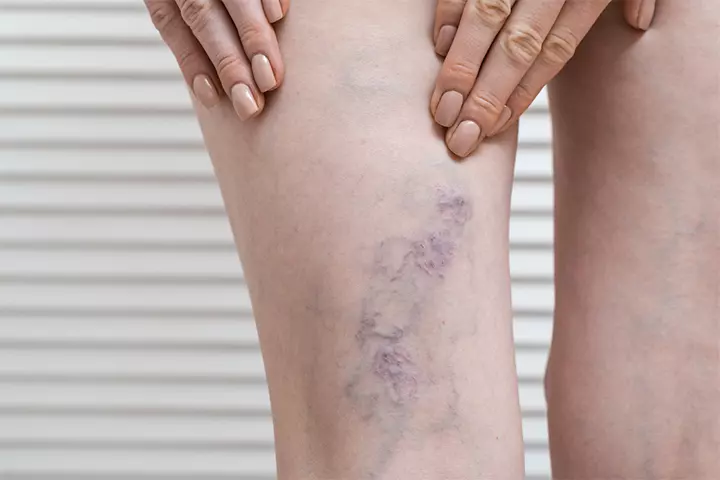
 Quick tip
Quick tip- The pressure put by the growing uterus on the bladder increases the frequency of urination.All this will lead to specific changes in your body.
In addition to the above-mentioned symptoms, Katy, a mother of two, describes the symptoms she observed during the 22nd week of her pregnancy. She shares, “It’s like I have suddenly hit a wall in the past week. I feel more tired. It could be that the heat has finally set in and perhaps that’s what is slowing me down and making me feel lethargic. I’m still doing great at eating healthy and exercising daily, so I know that is only positive for me….yet I am feeling so tired all of a sudden… My belly size is increasing, and I’m feeling a bit more achy. I’m experiencing some sciatic pain on my right side, feeling exhausted, and always ready to take a nap, especially with this heat (i).”
Changes In The Body At 22 Weeks
Here are some physical and emotional changes you may experience this week (12):
Physical changes
- Enlarged belly with a protruding navel
- Stretch marks

- Changing fingernails, as some women may experience faster growth of nails
- Discolored skin, as some dark patches develop due to increased melanin
- Bigger and darker nipples
Emotional changes
- Anxiety
- Mood swings

In some cases, you may experience unusual symptoms that indicate preterm labor. More about it next.
Can A Baby Survive If Born At 22 Weeks?
According to a cohort study done by the National Research Network, Japan, the babies born during the gestational age of 22 weeks have fewer chances of survival or are at a higher risk of having NDI (neurodevelopmental impairment) (13). Though with the advancement of technology in the medical field, the chances of survival have become better but there is still lack of enough evidence and data about the long-term prognosis and neurodevelopmental outcome of babies born at such early gestation. Nonetheless, a study published in the Journal of the American Medical Association analyzed 10,877 babies born between 2013 and 2018 and identified a significant increase in the survival rates of infants born between 22 and 28 weeks compared to previous years.
Next, we list down the symptoms that indicate the onset of preterm labor.
When To Call The Doctor
If you experience the following symptoms, call the doctor right away (21):
- A contraction (hardening of stomach along with pain) once every 10 minutes (5 or more in an hour)
- Braxton Hicks contractions (contractions, cramps or tightening in a particular abdominal area)
- Rupture of the amniotic sac causing the amniotic fluid to leak from the vagina
- Menstrual-like cramps
- Pelvic pressure
- A low and dull backache
- Abdominal cramps with or without diarrhea
- A sudden increase in vaginal discharge
- Blood from vagina
Otherwise, schedule a regular prenatal checkup.
Your OB/GYN Visit
During the antenatal visit, the doctor will check:
- Weight
- Blood pressure
- Gestational diabetes
- Fetal heart rate with a fetoscope
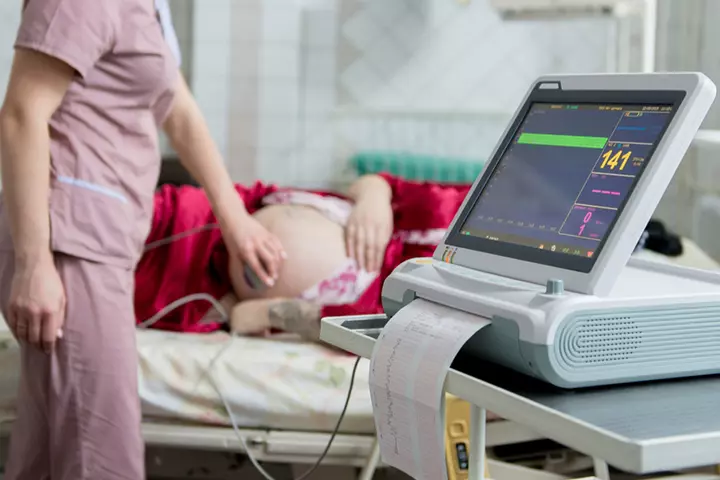
Additionally, a few tests may be done to check how the pregnancy is progressing and the rate of the fetal development.
Pregnancy tests
If an anomaly scan has been done at 18-20 weeks, ultrasound is not required at this gestation. However, if it is not done, then you might need one now. An ultrasound is for a comprehensive study of the fetal anatomy and fetal movement. However, it may not give details about all the organs. It helps in detecting any congenital defects or abnormalities in the fetus (15).
Besides following the doctor’s orders, you should also develop a healthy lifestyle for a better pregnancy experience. How can you make it possible? Read on to know.
Tips For Mom-to-be
Here are some prenatal care tips that you should follow to stay healthy and happy at this stage of pregnancy.
- Stay hydrated; drink at least eight glasses of water.
- Give your body eight hours of sleep in the night and two hours in the day.
- Add beans, vegetables, fruits, milk and dairy products, and meat in your diet.
- Eat home-cooked food and have small meals at regular intervals to satiate your cravings.
- Continue the prenatal vitamin supplements including vitamin C and folic acid among others.
- Exercise daily if there is no contraindication. Enroll in prenatal exercise groups.
- Avoid smoking, drinking alcohol, and drugs.
- Keep stress away and stay calm.
 Quick tip
Quick tip- Maintain oral hygiene by regularly brushing and flossing your teeth.
- Wear loose, breathable clothes.
- Avoid deep-fried and fatty foods. Add more fiber to your diet to reduce constipation.
- Avoid taking any medicines without the doctor’s permission.
- Avoid sitting crossed legged, as it can cause a backache.
- Wear comfortable maternity clothes and footwear.
- Avoid sitting for long hours and walk around frequently.
- Enroll in childbirth classes to learn more about labor and delivery.
- Spend time with family and friends.
- Read parenting books.
- Use a heating pad or sleep with a body pillow to ease the back pain.
Your partner can also help you feel better by helping you out a little.
Tips For The Dad-to-be
Here are a few pointers for daddy dearest.
- Sharing the responsibilities of household chores.
- Creating a pleasant environment at home.
- Accompanying you to prenatal visits.
- Taking you for shopping.
- Planning an outing for you.
- Giving you a good neck and foot massage for relaxation.
Frequently Asked Questions
1. What is the baby’s position at 22 weeks?
At 22 weeks, most babies lie transverse across mothers’ tummies. They can change position during this time to up and down and sideways (16).
2. How long do babies sleep in the womb at 22 weeks?
Unborn babies can sleep even when the mother is awake. They may sleep for long hours, around 12 to 14 hours daily from 21 to 24 weeks. However, you may not feel like the baby is sleeping (17).
3. Why is my belly hard at 22 weeks pregnant?
The uterus can be at the belly button around 20 weeks of pregnancy. This is when the week of gestation matches with fundal height. By the time you reach 20 weeks, occasionally, you can feel the uterus for a few seconds since it begins contracting (18).
4. Can my baby feel when I rub my belly at 22 weeks?
Babies may not be able to feel belly rubs at 22 weeks of pregnancy. They can feel and respond to belly rubs around the 26th week of pregnancy. Fetuses can only feel pain at 22 weeks (19).
5. What is the earliest a baby can be born and survive?
Neonatal unit care can enhance survival rates for prematurely born babies. Babies born beyond 24 weeks of gestation have a better chance of survival than those born earlier. Lungs and other vital organs are not developed enough before 24 weeks (20).
Pregnancy is not an easy journey though it is rewarding. In the 22nd week of pregnancy, you may undergo various physical changes and experience heartburn, leg cramps, constipation, backache, dizziness, etc. You may also experience emotional changes such as mood swings and anxiety. However, consult a doctor if you experience a contraction, pelvic pressure, menstrual-like cramps, or sudden increase in vaginal discharge. In addition, stay hydrated, ensure you get eight hours of sleep, eat a balanced diet with plenty of veggies, fruits, milk, and dairy products, and stay relaxed.
Infographic: Pregnancy Symptoms During 22 Weeks Of Gestation
Now that you’re in the 22nd week of pregnancy, you’ll soon complete your second trimester. Your baby has now evolved into the size of spaghetti squash, and you will have an evident baby bump. The following infographic explains what other changes and symptoms you may experience this week.
Some thing wrong with infographic shortcode. please verify shortcode syntaxIllustration: 22nd Week Pregnancy: Symptoms Baby Development And Tips

Image: Stable Diffusion/MomJunction Design Team
Congratulation on your 22nd week of pregnancy! As you are nearing your childbirth, learn about various changes and symptoms you may experience. Find out the ideal weight gain during pregnancy and get tips on maintaining good health.
Personal Experience: Source
MomJunction articles include first-hand experiences to provide you with better insights through real-life narratives. Here are the sources of personal accounts referenced in this article.
i. Baby #2 bump report – 22 weeks.https://babylute2013.wordpress.com/2015/06/20/baby-2-bump-report-22-weeks/
References
- Week by Week Fetus Size Demonstrated by Fruits.
https://epaoa.org/week-by-week-fetus-size-demonstrated-by-fruits/ - Fetal Development.
https://embryology.med.unsw.edu.au/embryology/index.php/Fetal_Development - Fetal Growth And Development.
https://doh.sd.gov/media/bnemplje/fetal.pdf - Week 22.
https://kidshealth.org/en/parents/week22.html - Fetal development.
https://medlineplus.gov/ency/article/002398.htm - 22 weeks pregnant.
https://raisingchildren.net.au/pregnancy/week-by-week/second-trimester/22-weeks - Prenatal Summary
https://www.ehd.org/prenatal-summary.php - Pregnancy calendar – Week 22
https://www.cgbabyclub.co.uk/pregnancy/weeks/22-weeks-pregnant.html - Pregnancy Weight Gain
https://americanpregnancy.org/healthy-pregnancy/pregnancy-health-wellness/pregnancy-weight-gain/#:~:text=On%20a%20trimester%20basis%20in - Calcium Vitamin D and Magnesium.
https://www.ncbi.nlm.nih.gov/books/NBK235246/ - Pregnancy at week 22.
https://www.pregnancybirthbaby.org.au/pregnancy-at-week-22 - Week 22 – your 2nd trimester
https://www.nhs.uk/start-for-life/pregnancy/week-by-week-guide-to-pregnancy/2nd-trimester/week-22/ - Nozomi Ishii et al.; (2013); Outcomes of Infants Born at 22 and 23 Weeks’ Gestation.
https://publications.aap.org/pediatrics/article-abstract/132/1/62/31345/Outcomes-of-Infants-Born-at-22-and-23-Weeks?redirectedFrom=fulltext - Hemorrhoids and Varicose Veins in Pregnancy
https://www.cedars-sinai.org/health-library/diseases-and-conditions/h/hemorrhoids-and-varicose-veins-in-pregnancy.html#:~:text=Increased%20blood%20volume%2C%20which%20enlarges,pelvis%20and%20legs%20to%20swell - Monitoring of Pregnancy and Medical Examinations During Pregnancy.
https://publicmoh.health.gov.il/pages/errorNotFound.html - 22 Weeks Pregnant.
https://raisingchildren.net.au/pregnancy/week-by-week/second-trimester/22-weeks#:~:text=Your%20baby%20when%20you%27re%2025%20weeks%20pregnant - Your Pregnancy: Week 21 to 24.
https://healthy.kaiserpermanente.org/health-wellness/maternity/second-trimester/weeks-21-24#:~:text=Your%20pregnancy%3A%20weeks%2025%20to%2025&text=Your%20baby%20is%20still%20small - Fundal Height.
https://my.clevelandclinic.org/health/diagnostics/22294-fundal-height - Bonding with your baby during pregnancy.
https://www.pregnancybirthbaby.org.au/bonding-with-your-baby-during-pregnancy#:~:text=Sensation - You And Your Baby At 24 Weeks Pregnant.
https://www.nhs.uk/pregnancy/week-by-week/13-to-27/24-weeks/#:~:text=By%20the%20time%20you%27re
Community Experiences
Join the conversation and become a part of our nurturing community! Share your stories, experiences, and insights to connect with fellow parents.
Read full bio of Dr. Asmita Kaundal
Read full bio of Sakshi Mishra
Read full bio of Rebecca Malachi
Read full bio of Aneesha Amonz





